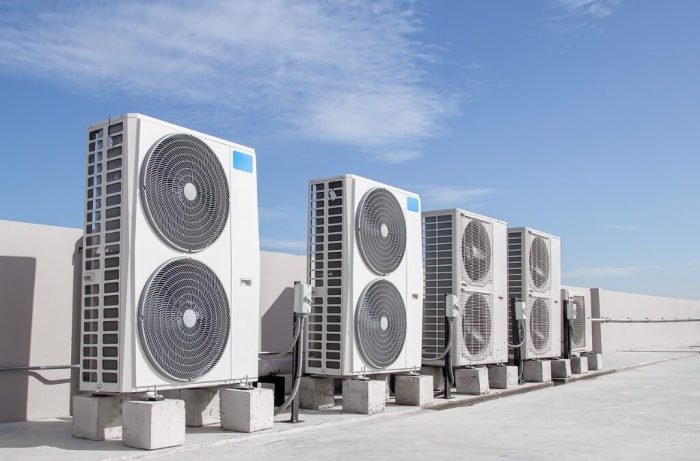Optimizing Commercial AC Performance: The Importance of Maintenance
With commercial AC maintenance at the forefront, this paragraph opens a window to an amazing start and intrigue, inviting readers to embark on a storytelling casual formal language style filled with unexpected twists and insights.
Regular maintenance is the key to ensuring your commercial AC system runs smoothly and efficiently. In this guide, we will explore the essential components of maintenance, frequency recommendations, DIY tips, and more to keep your system in top shape.
Importance of Commercial AC Maintenance
Regular maintenance of commercial AC systems is crucial to ensure optimal performance and longevity. By conducting routine maintenance, businesses can benefit in various ways compared to reactive repairs.
Benefits of Routine Maintenance
- Prevent Breakdowns: Regular maintenance helps identify and address potential issues before they escalate into major problems, reducing the risk of unexpected breakdowns that can disrupt operations.
- Improved Efficiency: Proper maintenance ensures that the AC system operates at peak efficiency, reducing energy consumption and lowering utility costs.
- Extended Lifespan: Regular servicing can prolong the lifespan of the commercial AC unit, saving businesses the cost of premature replacements.
- Enhanced Air Quality: Clean filters and components result in better indoor air quality, creating a healthier and more comfortable environment for employees and customers.
Key Components of Commercial AC Maintenance
Regular maintenance of commercial AC units is crucial to ensure optimal performance and longevity. There are several key components that should be included in a comprehensive maintenance service to keep the system running efficiently.
Air Filters
- Inspect and replace air filters regularly to maintain good indoor air quality and prevent strain on the system.
- Dirty filters can restrict airflow, reduce cooling efficiency, and lead to increased energy consumption.
Coils
- Clean evaporator and condenser coils to maintain proper heat transfer and cooling capacity.
- Dirty coils can reduce efficiency, increase operating costs, and cause system breakdowns.
Refrigerant Levels
- Check and adjust refrigerant levels to ensure proper cooling performance.
- Low refrigerant levels can indicate a leak, which can damage the compressor and reduce system efficiency.
Thermostat Calibration
- Calibrate the thermostat to ensure accurate temperature control and prevent overworking the system.
- An improperly calibrated thermostat can lead to uneven cooling, energy waste, and discomfort for occupants.
Frequency and Scheduling of Maintenance
Maintaining your commercial AC system is crucial for ensuring optimal performance and longevity. Now let's dive into how often you should schedule maintenance visits and the factors that can influence this frequency.
Recommended Maintenance Frequency
It is generally recommended to have your commercial AC system serviced at least twice a year. Ideally, scheduling maintenance visits in the spring before the peak cooling season and in the fall before the heating season can help address any potential issues before they escalate.
Factors Influencing Maintenance Frequency
- Usage: The more frequently your commercial AC system is used, the more wear and tear it undergoes, necessitating more frequent maintenance.
- Environment: Factors like dust, humidity, and pollution in the environment can impact the efficiency of your AC system, requiring more regular maintenance.
- System Age: Older systems may require more frequent maintenance to ensure they continue to operate efficiently.
Sample Maintenance Schedule
| Type of Building | Recommended Maintenance Frequency |
|---|---|
| Office Buildings | Twice a year (Spring and Fall) |
| Retail Stores | Quarterly |
| Restaurants | Monthly |
| Industrial Facilities | Bi-annually |
DIY Maintenance Tips for Commercial AC Systems

Maintaining your commercial AC system between professional services is crucial to ensure its efficiency and longevity. Here are some practical tips for facility managers or building owners to follow:
Regularly Clean or Replace Air Filters
- Inspect air filters every month and replace them if they are dirty or clogged.
- Dirty filters restrict airflow and reduce the system's efficiency, leading to increased energy consumption.
- Follow manufacturer's recommendations for the type and frequency of filter replacements.
Clean the Outdoor Unit
- Remove any debris, leaves, or dirt from the outdoor unit to prevent airflow blockages.
- Trim vegetation around the unit to ensure proper ventilation and airflow.
- Regularly check and clean the condenser coils to maintain optimal cooling performance.
Monitor Thermostat Settings
- Ensure the thermostat is set at the correct temperature to avoid unnecessary strain on the system.
- Program the thermostat to adjust temperatures based on occupancy hours to save energy.
- Consider upgrading to a smart thermostat for better control and energy efficiency.
Inspect Ductwork for Leaks
- Check for leaks or gaps in the ductwork that can lead to energy wastage and reduced cooling efficiency.
- Seal any leaks with duct tape or caulk to improve airflow and prevent air loss.
- Consider hiring a professional duct cleaning service for a thorough inspection and maintenance.
Schedule Regular Professional Maintenance
- While DIY maintenance is essential, regular professional maintenance by certified technicians is crucial for optimal system performance.
- Arrange annual or bi-annual maintenance visits to inspect, clean, and tune-up the system.
- Professional technicians can identify potential issues early and prevent costly repairs or breakdowns.
End of Discussion
In conclusion, commercial AC maintenance is not just a necessity but a strategic investment in the longevity and efficiency of your system. By following the recommended maintenance schedules and tips provided, you can enjoy optimal performance and cost savings in the long run.
Query Resolution
How often should commercial AC systems be serviced?
It is recommended to have professional maintenance at least twice a year to ensure optimal performance.
What are some DIY maintenance tips for commercial AC systems?
Simple tasks like regularly cleaning filters, checking for leaks, and ensuring proper airflow can help extend the lifespan of your system.




